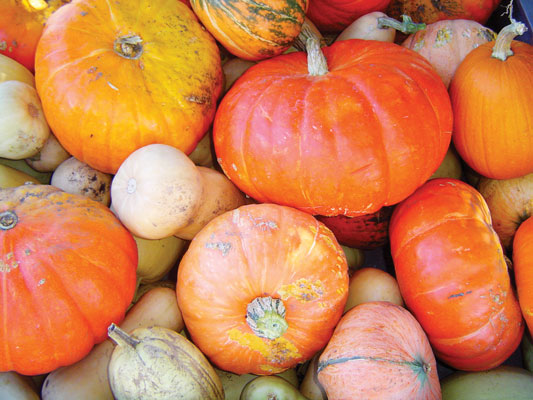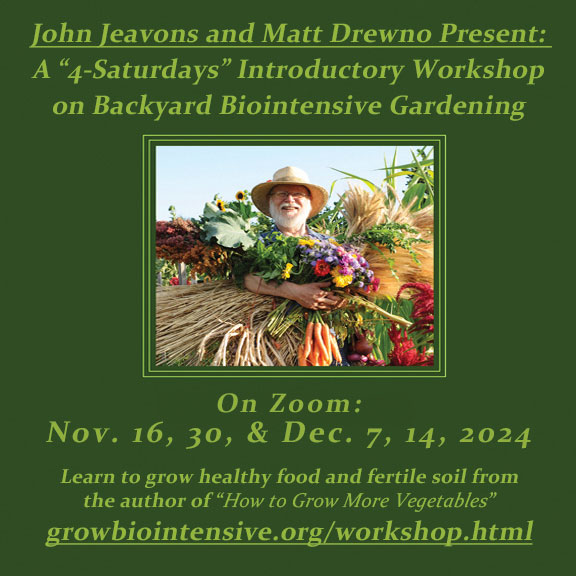The Jeavons Center Mini-Farm Report
This fall, I’m thinking about the progress being made in GB Teacher Certification in Africa, the result of cross-pollination between our African and Latin American partners, G-BIACK and ECOPOL/El Mezquite last November. Africa is a continent made up of 54-58 countries with over 1 billion people of diverse cultures and soils, and an abundance of natural resources. However, food insecurity and malnutrition are widespread, with 1 in 5 Africans facing hunger in 2023—almost double the global average. The most vulnerable Africans often live on the margins, with access only to small pieces of land with low fertility. GROW BIOINTENSIVE can greatly assist these people in building up soil quality and producing more healthy food to eat. And it is: through the dedicated work of our partner organizations, we estimate that millions of farmers across Africa have been exposed to GB. But after many decades, there were no certified GB teachers in Africa. Meanwhile, across Latin America, the Caribbean, and Europe, Juan Manuel Martínez, Agustín Medina, and Marisol Tenorio Lopez have had astonishing success teaching and certifying hundreds of GB Teachers through their non-profit ECOPOL/El Mezquite. The certification worshops that Marisol and Agustín give in Mexico and other countries adhere to the guidelines of Ecology Action’s Self-Teaching Mini-Series Booklet 30, and are similar to what is done by Ecology Action in California, with one key difference: before the 5-day Certification workshop, in a program they call Learning Circles, Marisol regularly meets on Zoom with teacher candidates to answer questions, discuss challenges, and ensure that they have read How to Grow More Vegetables and have assimilated the fundamental elements of GB. This strategy has been so successful that Certified Basic-Level GB teachers who are candidates for Intermediate-Level certification support the process for the next group of Basic-Level candidates in a program called Learning Circles II. More certified teachers help spread GB quickly—and with high quality—across a region. Seeing the teacher certification gap in Africa, Juan Manuel, Marisol, and Agustín kindly offered to help. So, with the assistance of a generous bequest from a long-time donor’s estate, Ecology Action funded an international GROW BIOINTENSIVE outreach and networking event in which ECOPOL/El Mezquite's three Master- Level GB Certified Teachers traveled from Mexico to Kenya to give a week-long basic-level GROW BIOINTENSIVE Teacher Certification Workshop in November 2023, hosted by the co-directors of our partner organization for Africa, Samuel Nderitu and Peris Wanjiru Nderitu of the GROW BIOINTENSIVE Agriculture Centre of Kenya (G-BIACK). The participants at the workshop were grouped into “Beginners” who understand the 8 Essential Principles of GB and implement them in their gardens; “Intermediates” who have practiced GB with all 8 Principles for at least two years; and “Advanced” who had all participated in some form of internship, either in-person or over Zoom. The result of this event is that there are now 50 Basic-Level GB Teacher Candidates in Africa, working their way through the program requirements, 25 of whom Juan estimates will become certified. Certification means a GB teacher has demonstrated that they truly understand how to practice the method sustainably, using all eight elements of GB, including keeping track of their soil and crop data. Agustín has noted that one of the challenges certification candidates face in Africa is a general resistance to recording their data, but it is essential for understanding and achieving truly sustainable (and maintainable) GROW BIOINTENSIVE soil fertility and high yields over time. Certified teachers maintain GB demonstration gardens and hold workshops of their own, training participants to use the method and identifying new candidates for certification. In this way, GB grows out into communities like healthy mycelia in the soil, making numerous, intricate connections, sharing information and growing fertility into abundance. In addition to the larger group, five candidates were identified in Kenya for fast-track teacher certification within a year, based on their longterm work with their own well-established GROW BIOINTENSIVE programs and projects: Samuel Nderitu (G-BIACK), Wamalwa Murefu (Biointensive for Africa), Boaz Odour (Good Nutrition for Everyone), Simon Nyaga (Bold Impact Africa), and Mlesh Mlegwah (Garden of Hope). We are confident this core group of individuals will not only help spread GB through their training programs, but represent the future of regenerative farming in Eastern Africa. Samuel and Wamalwa have already obtained their Basic- Level certification, and Boaz, Simon, and Mlesh are on track to Basic-Level Certification by the end of the year. Juan estimates it will take them all five years or less to reach Advanced Certification, at which point there will be five Master-Level teachers in Africa. For the next five years, ECOPOL/El Mezquite has committed to hold Learning Circle sessions online with the Kenyan group once or twice per month. It's so heartening to see this cooperative work among people from such diverse cultures and geographies yielding such good results, and I look forward to the blossoming of the African GB Teacher Certification Program. My thanks and blessings go out to everyone involved, including our generous donors: Asante and Gracias! Meanwhile, here at The Jeavons Center, the work is ongoing: now in our 52nd year on our hillside outside Willits, CA, we’re continuing to nurture our mini-farm ecosystem with the goal of helping improve GB, so that small-scale farmers and gardeners around the world can do more with less. This work includes the "Growing Bed 21" experiment: an ongoing study of benefits and challenges of using four different types of compost with different carbon:nitrogen ratios on different parts of the same growing bed. The results of this study may be used to show people how to hold more water and nutrients in the soil—an important piece of information for the five billion people, or around two-thirds of the world’s population, who will face severe water shortages by the year 2050. It also includes experimenting with different crops to understand which ones work best under the difficult conditions marginalized farmers face. This August, we planted Early Stone Age Wheat, known as Einkorn (Triticum monococcum). First cultivated in the fertile crescent of the Tigris/Euphrates confluence 10,000 years ago, Einkorn is known as our “first wheat”. The name comes from the German word for “single grain” as each spikelet contain a single flower and produces only one seed, unlike the multi-grain spikes of modern wheat. Einkorn is interesting because it is heat tolerant, and has a much shorter growing season, taking only 5 months to mature compared with 8 months for Hard Red Spring (HRS) Wheat. It contains 18.3% more protein than modern wheat, and more antioxidants as well, with a milder flavor (and potentially better digestibility, as it lacks modern wheat's "D" chromosome, which is associated with wheat intolerance in many humans). Depending on the climate, it can grow up to 2.5 feet high with as many as 8 soil-aerating tillers, compared with 5 feet/4-5 tillers for HRS Wheat. Grown on 5-inch centers, we expect an intermediate- level GB yield of 10 lbs/100ft2. The downside is that Einkorn is harder to thresh than HRS Wheat: we currently thresh it by hand, with gloves on, but are working on a better way. Want to try it out? You can find Einkorn at quailseeds.com, and you can learn the GROW BIOINTENSIVE method at our upcoming 4-Saturdays Online Workshop. ♥ top | Newsletter Home |Table of Contents| Archive
|


 As autumn approaches, and we begin to
bring in the harvest at The Jeavons Center,
my mind turns to celebrating another
kind of fruition: the one that comes from the
global GROW BIOINTENSIVE movement, of the
work we and our international partners are doing
to “Teach people worldwide to better feed themselves
while building and preserving the soil and
conserving resources.”
As autumn approaches, and we begin to
bring in the harvest at The Jeavons Center,
my mind turns to celebrating another
kind of fruition: the one that comes from the
global GROW BIOINTENSIVE movement, of the
work we and our international partners are doing
to “Teach people worldwide to better feed themselves
while building and preserving the soil and
conserving resources.”
